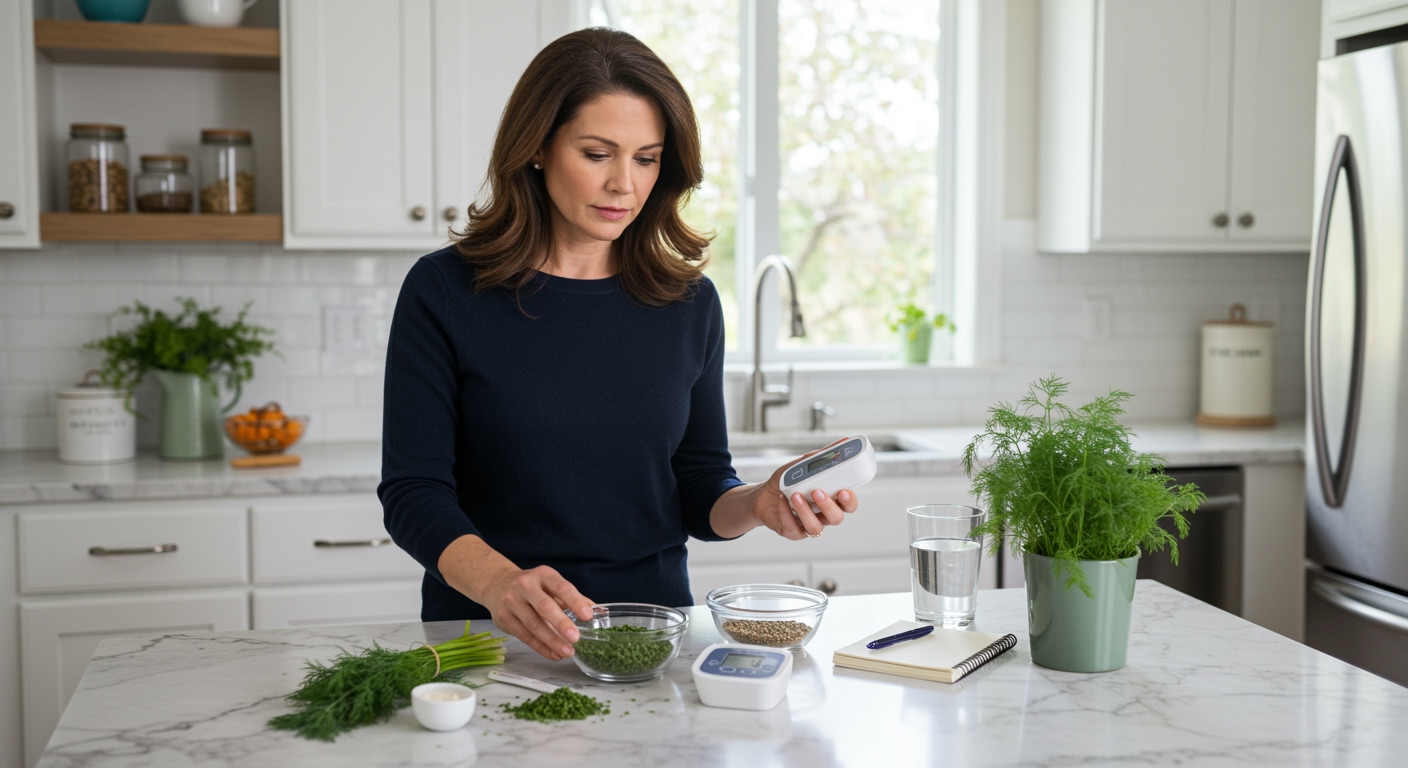✪ Key Takeaway: Low blood pressure patients should use dill seeds cautiously as they can further reduce blood pressure by 10-20 mmHg.
Introduction
Your grandmother probably used dill seeds in her cooking without thinking twice about their effects on blood pressure.
You might be wondering about this connection because you have low blood pressure and want to know if common kitchen spices could make your condition worse.
Hi, I am Abdur, your nutrition coach and today I am going to explain exactly how dill seeds affect blood pressure and whether you should avoid them if you have hypotension.
How Do Dill Seeds Actually Affect Blood Pressure?
Dill seeds contain flavonoids and essential oils that directly impact your cardiovascular system.
The main compound responsible for blood pressure effects is carvone, which makes up about 40-60% of dill seed essential oil.
This compound works by relaxing the smooth muscles in your blood vessel walls, causing them to dilate or widen.
When your blood vessels dilate, there is more space for blood to flow through, which naturally reduces pressure against the vessel walls.
Research shows that dill seed extract can lower systolic blood pressure by 10-15 mmHg and diastolic pressure by 5-10 mmHg in some individuals.
The effect typically begins within 30-60 minutes of consumption and can last for 2-4 hours depending on the amount consumed and your individual metabolism.
✪ Fact: Dill seeds have been used medicinally for over 3,000 years to treat various ailments including digestive issues.
What Happens When You Already Have Low Blood Pressure?
If your blood pressure is already below 90/60 mmHg, adding dill seeds to your diet could push it into dangerous territory.
When blood pressure drops too low, your brain and other vital organs do not receive adequate blood flow and oxygen.
This condition, called severe hypotension, can cause dizziness, fainting, confusion, and in extreme cases, shock.
Your body has natural mechanisms to maintain blood pressure, but these systems can become overwhelmed when external factors like dill seeds add extra vasodilation.
The baroreceptors in your arteries detect pressure changes and signal your heart to beat faster or slower accordingly.
However, if dill seeds cause significant vasodilation, your heart may not be able to compensate quickly enough, leading to symptoms like lightheadedness or weakness.
✪ Pro Tip: Monitor your blood pressure for 2 hours after consuming dill seeds to track any changes.
Are There Safe Ways To Use Dill Seeds With Low Blood Pressure?
You do not have to completely eliminate dill seeds from your diet, but you need to be strategic about how you use them.
Start with very small amounts, such as a pinch or about 1/8 teaspoon, and observe how your body responds.
Consume dill seeds with food rather than on an empty stomach, as this slows absorption and reduces the intensity of blood pressure effects.
Avoid using dill seeds during times when you need to be alert and active, such as before driving or exercising.
Consider using fresh dill leaves instead of seeds, as they contain lower concentrations of the active compounds that affect blood pressure.
If you experience any symptoms like dizziness, nausea, or unusual fatigue after consuming dill seeds, stop using them immediately and consult your healthcare provider.
✪ Note: Fresh dill leaves contain only 10-20% of the blood pressure-lowering compounds found in seeds.
When Should You Completely Avoid Dill Seeds?
There are specific situations where dill seeds pose too much risk for people with low blood pressure.
If your systolic pressure is consistently below 80 mmHg or diastolic below 50 mmHg, avoid dill seeds entirely.
People taking blood pressure medications, especially ACE inhibitors or diuretics, should not use dill seeds without medical supervision.
The combination can cause additive effects, leading to dangerously low blood pressure that requires emergency treatment.
If you have a history of fainting spells, postural hypotension, or cardiovascular disease, dill seeds could worsen these conditions.
Pregnant women with low blood pressure should also avoid dill seeds, as hormonal changes already affect cardiovascular stability.
✪ Pro Tip: Keep a blood pressure log when trying any new herbs or spices to identify patterns.
What Other Spices Should You Watch Out For?
Dill seeds are not the only kitchen spice that can affect your blood pressure in unexpected ways.
Garlic, especially in large amounts, can lower blood pressure by 5-10 mmHg through similar vasodilation mechanisms.
Turmeric contains curcumin, which has mild blood pressure-lowering effects and can interact with cardiovascular medications.
Cinnamon, particularly Ceylon cinnamon, can reduce both systolic and diastolic pressure when consumed regularly in therapeutic doses.
On the flip side, some spices like black pepper and ginger can temporarily raise blood pressure, which might actually be beneficial for hypotensive individuals.
The key is understanding how each spice affects your individual physiology and adjusting your intake accordingly.
✪ Fact: Black pepper can temporarily increase blood pressure by 10-15 mmHg due to its piperine content.
The Bottom Line
Low blood pressure patients should approach dill seeds with caution, using small amounts and monitoring their response carefully.
Food is medicine, but like all medicine, timing and dosage matter more than most people realize.
I would love to hear about your experiences with dill seeds or any questions you have about managing low blood pressure through nutrition in the comments below.
References
At NutritionCrown, we use quality and credible sources to ensure our content is accurate and trustworthy. Below are the sources referenced in creating this article:





